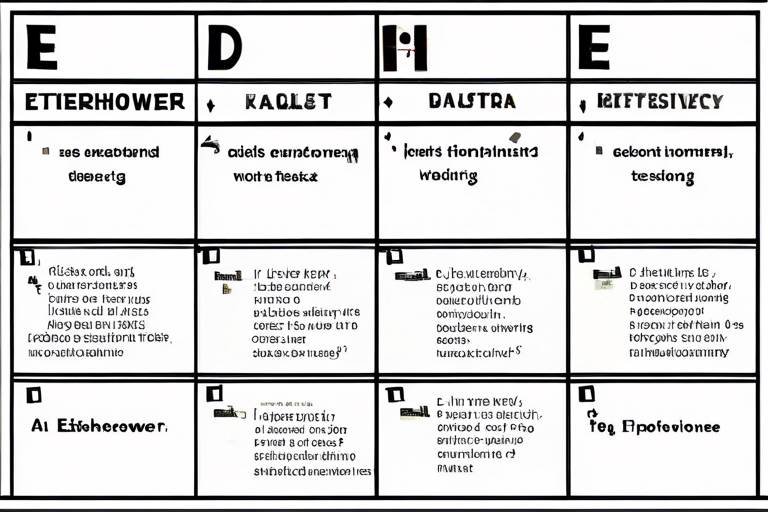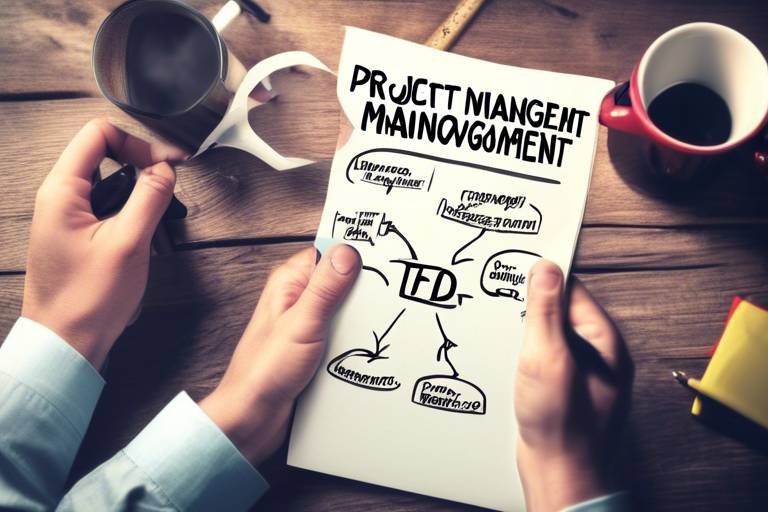Tips for Overcoming Procrastination and Improving Productivity
Procrastination can be a significant roadblock to achieving our goals and maximizing our productivity. It often sneaks up on us, leading to delays and missed opportunities. However, with the right strategies and mindset, it is possible to overcome procrastination and enhance our efficiency in daily tasks. By implementing practical techniques and fostering a productive environment, we can tackle procrastination head-on and pave the way for improved productivity.

Identifying Procrastination Triggers
Procrastination can be a sneaky thief of time, robbing us of our productivity and leaving us feeling overwhelmed. But fear not, there are practical strategies you can employ to beat procrastination and supercharge your productivity. By mastering time management techniques, setting SMART goals, and staying motivated, you can turn the tables on procrastination and reclaim your focus.
Procrastination often has underlying triggers that push us towards avoidance behavior. It's crucial to dive deep and understand what sets off your procrastination tendencies. Is it fear of failure, perfectionism, or simply feeling overwhelmed? By recognizing these triggers, you can take proactive steps to address them and prevent procrastination from taking hold.

Creating a Productive Environment
When it comes to maximizing productivity, creating a conducive workspace is essential. Imagine your workspace as a garden – to flourish, it needs proper care and attention. Start by organizing your desk in a way that promotes efficiency. Keep essential items within reach and declutter your surroundings to minimize distractions. Just like a well-tended garden, a clean and organized workspace can help cultivate a focused mindset.
Consider the impact of your environment on your work. Is your workspace filled with noisy distractions or does it offer a peaceful atmosphere for concentration? Just as a gardener removes weeds to allow flowers to bloom, eliminate distractions that hinder your focus. Whether it's turning off notifications on your phone or finding a quiet corner to work, creating a peaceful environment can nurture your productivity.
Think of your workspace as a blank canvas waiting to be filled with inspiration. Personalize it with motivational quotes, plants, or artwork that energize your mind and spark creativity. Much like a well-designed garden, a visually appealing workspace can inspire you to tackle tasks with renewed vigor and enthusiasm.
Consider the lighting in your workspace – just as plants need sunlight to thrive, adequate lighting can enhance your productivity. Natural light can uplift your mood and increase alertness, while a well-lit environment can reduce eye strain and fatigue. By optimizing the lighting in your workspace, you can create an environment that supports your work and boosts your efficiency.
Lastly, don't underestimate the power of comfort in your workspace. Just as a gardener rests on a comfortable bench to admire their handiwork, ensure your chair and desk are ergonomically designed for long hours of work. By prioritizing comfort, you can enhance your focus and productivity throughout the day.
Q: How can I maintain a productive environment while working from home?
A: When working from home, designate a specific area as your workspace to create a boundary between work and leisure. Ensure this space is free from distractions and has all the necessary tools for productivity.
Q: How often should I reassess and adjust my workspace for optimal productivity?
A: It's recommended to regularly evaluate your workspace to ensure it continues to support your productivity. Make adjustments as needed to maintain an environment that fosters focus and efficiency.

Setting SMART Goals
Setting SMART goals is a crucial aspect of enhancing productivity and achieving success in various areas of life. The acronym SMART stands for Specific, Measurable, Achievable, Relevant, and Time-bound, outlining the key criteria for effective goal setting. By incorporating these elements into your goal-setting process, you can significantly increase your motivation, track your progress more effectively, and maintain a sense of momentum towards achieving your objectives.
When setting Specific goals, it is essential to clearly define what you want to accomplish. By being precise about the desired outcome, you can focus your efforts more efficiently and avoid ambiguity that may lead to procrastination or lack of direction.
Ensuring that your goals are Measurable allows you to track your progress and evaluate your success along the way. By establishing specific metrics or milestones to measure your advancement, you can stay motivated and adjust your strategies if necessary to stay on course.
Setting Achievable goals is crucial for maintaining a sense of realism and avoiding setting yourself up for failure. While it's essential to challenge yourself, setting unattainable goals can lead to frustration and demotivation. By setting objectives that are within reach but still require effort, you can build confidence and momentum towards larger accomplishments.
Ensuring that your goals are Relevant to your overall objectives and aspirations is key to staying focused and aligned with your long-term vision. By choosing goals that are meaningful and contribute to your growth and development, you can maintain a sense of purpose and drive throughout the goal pursuit process.
Lastly, setting Time-bound goals provides a sense of urgency and accountability, helping you prioritize tasks and allocate resources effectively. By establishing deadlines or timeframes for your goals, you create a sense of structure and commitment that can prevent procrastination and enhance productivity.

Time Management Techniques
Time management is a crucial aspect of overcoming procrastination and enhancing productivity in daily life. By implementing effective time management techniques, individuals can optimize their workflow, prioritize tasks efficiently, and make the most of their available time. One popular method that many find beneficial is the Pomodoro Technique, which involves breaking work into intervals with short breaks in between to maintain focus and prevent burnout. This strategy not only aids in managing time effectively but also boosts productivity by promoting regular rest periods.
In addition to the Pomodoro Technique, another valuable time management approach is prioritizing tasks based on their importance and urgency. By categorizing tasks into different levels of priority, individuals can ensure that crucial assignments are completed first, minimizing the risk of missing deadlines or neglecting essential responsibilities. Moreover, scheduling dedicated blocks of time for work and incorporating short breaks can help maintain focus and prevent mental fatigue, ultimately leading to increased efficiency and productivity.
Furthermore, time management encompasses the concept of setting realistic deadlines and adhering to them diligently. By establishing specific timeframes for completing tasks and projects, individuals can create a sense of urgency and motivation to stay on track. This practice not only aids in managing workload effectively but also instills a sense of accomplishment and progress as goals are met within the stipulated timeframes.
Moreover, incorporating the concept of time blocking into one's daily routine can significantly enhance productivity. By allocating specific time slots for different activities or projects, individuals can streamline their workflow, reduce multitasking, and maintain concentration on one task at a time. This structured approach to time management enables individuals to make efficient use of their time and avoid distractions that may derail their focus and productivity.
Overall, mastering time management techniques is essential for overcoming procrastination and maximizing productivity. By utilizing strategies such as the Pomodoro Technique, prioritizing tasks effectively, setting realistic deadlines, and implementing time blocking, individuals can enhance their efficiency, focus, and overall performance in both personal and professional endeavors.

Utilizing the Two-Minute Rule
The Two-Minute Rule is a powerful strategy that can revolutionize your approach to productivity. The concept is simple yet incredibly effective – if a task takes two minutes or less to complete, do it immediately. By tackling these quick tasks right away, you prevent them from piling up and causing overwhelm. This rule is based on the idea that small actions can lead to significant progress over time. It's like cleaning up a few drops of water before they turn into a flood, maintaining order and preventing chaos.
Imagine your to-do list as a garden that needs regular weeding. The Two-Minute Rule allows you to pluck out the small weeds before they grow into unruly plants that take over the entire garden. It's about taking proactive steps to maintain control and prevent procrastination from creeping in. By swiftly addressing these minor tasks, you create a sense of accomplishment and momentum that propels you forward.
Moreover, implementing the Two-Minute Rule trains your brain to develop a bias towards action. Instead of hesitating or delaying, you cultivate a habit of immediate execution for quick wins. This proactive mindset not only boosts your productivity but also instills a sense of confidence and control over your workload. It's like building a strong foundation for a house – each small task completed is a brick that strengthens the structure of your productivity.
By embracing the Two-Minute Rule, you transform the way you approach tasks and time management. It encourages efficiency, prevents procrastination, and fosters a proactive attitude towards productivity. Remember, it's the little steps that pave the way for significant progress. So, next time you encounter a task that takes two minutes or less, seize the opportunity to tackle it immediately and witness the positive impact it has on your productivity journey.

Practicing Mindfulness and Self-Reflection
Mindfulness and self-reflection are powerful tools that can significantly improve productivity and overall well-being. By practicing mindfulness, you can train your mind to focus on the present moment, allowing you to fully engage in tasks and activities without being distracted by thoughts of the past or future. Self-reflection, on the other hand, involves taking the time to assess your actions, behaviors, and decisions, leading to a deeper understanding of yourself and your habits.
Imagine mindfulness as a mental workout that strengthens your ability to concentrate and stay attentive to the task at hand. Just like physical exercise builds muscle, mindfulness exercises your brain, enhancing your cognitive functions and boosting productivity. By being fully present in each moment, you can work more efficiently, make better decisions, and reduce stress and anxiety.
Self-reflection acts as a mirror that allows you to see yourself more clearly. It enables you to identify patterns in your behavior, recognize areas for improvement, and celebrate your strengths. Through self-reflection, you can gain valuable insights into your work habits, time management skills, and overall performance, leading to personal growth and increased productivity.
Combining mindfulness with self-reflection creates a powerful synergy that enhances your productivity efforts. By being mindful of your thoughts and actions, you can better understand how they impact your work and goals. Self-reflection then enables you to make adjustments, set new priorities, and align your actions with your objectives, resulting in increased efficiency and effectiveness.
Practicing mindfulness and self-reflection doesn't have to be complicated or time-consuming. Simple techniques such as deep breathing exercises, short meditation sessions, or journaling can help you cultivate mindfulness and self-awareness. By incorporating these practices into your daily routine, you can develop a stronger sense of focus, clarity, and purpose, ultimately leading to improved productivity and overall satisfaction.

Seeking Accountability and Support
Seeking accountability and support is crucial in overcoming procrastination and improving productivity. By partnering with a friend, colleague, or coach, you can create a system of checks and balances to keep you on track with your goals. This accountability helps you stay motivated and focused, knowing that someone is there to support and encourage you along the way.
Accountability partners can provide valuable insights, offer different perspectives, and help you navigate challenges that may arise. They can hold you responsible for your actions, ensuring that you follow through on your commitments and stay disciplined in your work habits. Having someone to share your progress with can also boost your confidence and provide a sense of camaraderie in your journey towards increased productivity.
Support from others can be a source of inspiration and motivation when you're feeling overwhelmed or demotivated. It's comforting to know that you're not alone in your struggles and that there are people rooting for your success. Whether it's a simple word of encouragement or a more structured coaching relationship, seeking support can make a significant difference in your ability to overcome procrastination and achieve your productivity goals.

Rewarding Progress and Celebrating Achievements
Procrastination can be a significant hurdle to productivity, but with the right strategies, you can overcome it and boost your efficiency. By implementing practical techniques such as time management, goal setting, and motivation tips, you can take control of your daily life and achieve your goals.
Understanding the root causes of procrastination is crucial for combating this behavior. By recognizing the situations or emotions that trigger avoidance tendencies, you can address them proactively and develop healthier work habits.
Organizing your workspace plays a vital role in promoting productivity. Minimizing distractions, decluttering your desk, and creating a conducive atmosphere for focused work can significantly improve your efficiency and concentration.
Setting Specific, Measurable, Achievable, Relevant, and Time-bound (SMART) goals is a powerful way to enhance motivation and track your progress. By establishing clear objectives, you can stay on target and maintain momentum towards achieving your desired outcomes.
Effective time management is key to combating procrastination. Techniques such as the Pomodoro Technique, which involves working in focused intervals with short breaks, prioritizing tasks, and scheduling dedicated blocks of time for work and rest, can help you make the most of your day.
The Two-Minute Rule is a simple yet effective strategy for minimizing procrastination. By completing tasks that take less than two minutes immediately, you can prevent them from piling up and reduce the likelihood of procrastinating on small but essential activities.
Cultivating mindfulness and engaging in regular self-reflection can enhance your awareness of your thoughts and behaviors. By fostering a positive mindset and staying present in the moment, you can boost your focus and productivity in your daily tasks.
Partnering with a friend, colleague, or coach can provide valuable accountability and support in overcoming procrastination habits. Having someone to hold you answerable, offer encouragement, and provide guidance can significantly increase your chances of staying on track with your goals.
Recognizing your progress and celebrating your achievements is essential for maintaining motivation and momentum. By acknowledging milestones, whether big or small, and rewarding yourself for staying committed to your productivity goals, you can reinforce positive behavior and continue on the path to success.
Frequently Asked Questions
- What are some common signs of procrastination?
Common signs of procrastination include constantly delaying tasks, feeling overwhelmed by the workload, making excuses to avoid work, and experiencing a lack of motivation or focus.
- How can I stop procrastinating and improve my productivity?
To overcome procrastination, you can try setting specific goals, breaking tasks into smaller steps, using time management techniques like the Pomodoro Technique, creating a conducive work environment, and seeking support from friends or colleagues.
- Why is goal setting important in overcoming procrastination?
Goal setting helps provide clarity on what needs to be accomplished, creates a sense of direction, motivates you to stay on track, and allows you to measure progress effectively, all of which are crucial in combating procrastination.
- What is the Two-Minute Rule and how can it help with productivity?
The Two-Minute Rule suggests that if a task takes less than two minutes to complete, you should do it immediately. This rule helps in preventing small tasks from piling up, reducing procrastination, and maintaining a sense of accomplishment.
- How can mindfulness and self-reflection aid in improving productivity?
Practicing mindfulness allows you to stay present, manage distractions effectively, and cultivate a positive mindset. Self-reflection helps in identifying patterns of behavior, understanding triggers for procrastination, and making necessary adjustments to enhance productivity.


















